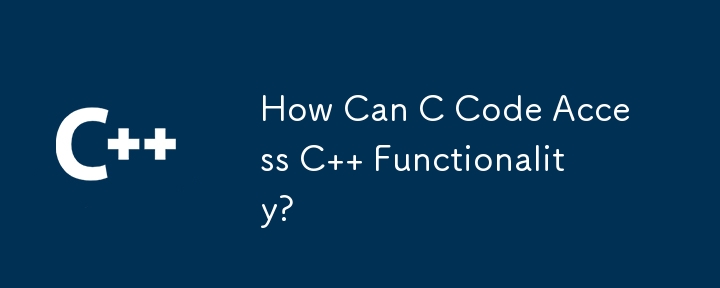

Bridging the C-C Divide: Exposing C Functionality in C Applications
When working with mixed-language environments, the ability to seamlessly integrate code written in different languages becomes crucial. This problem is even more pronounced when the code is written in C and C , as C 's name mangling poses a challenge.
Consider the need to call C functions from C. In the C domain, the extern "C" keyword allows us to expose functions in a C-compatible manner, providing a straightforward way to use C functions in C applications. However, the reverse scenario, where C code must call C functions, presents a different set of obstacles.
Overcoming Name Mangling
The primary hurdle arises from the name mangling conventions used by C . These conventions make it difficult for C code to directly reference C symbols, leading to unresolved symbol errors.
To overcome this, a common approach involves creating a C API that wraps the C functionality. This API consists of pure C code that exposes the desired functionality without using C classes or objects. By following an object-oriented style, the API can provide a familiar interface for C code to interact with.
Example Implementation
Here's how the C API approach can be implemented in practice:
// *.h file #ifdef __cplusplus #define EXTERNC extern "C" #else #define EXTERNC #endif typedef void* mylibrary_mytype_t; EXTERNC mylibrary_mytype_t mylibrary_mytype_init(); EXTERNC void mylibrary_mytype_destroy(mylibrary_mytype_t mytype); EXTERNC void mylibrary_mytype_doit(mylibrary_mytype_t self, int param); #undef EXTERNC
// *.cpp file
mylibrary_mytype_t mylibrary_mytype_init() {
return new MyType;
}
void mylibrary_mytype_destroy(mylibrary_mytype_t untyped_ptr) {
MyType* typed_ptr = static_cast<MyType*>(untyped_ptr);
delete typed_ptr;
}
void mylibrary_mytype_doit(mylibrary_mytype_t untyped_self, int param) {
MyType* typed_self = static_cast<MyType*>(untyped_self);
typed_self->doIt(param);
}In this example, the C API provides a set of functions to create, destroy, and manipulate an object of type MyType, hiding the implementation details of the C classes and objects behind the scenes.
The above is the detailed content of How Can C Code Access C Functionality?. For more information, please follow other related articles on the PHP Chinese website!




